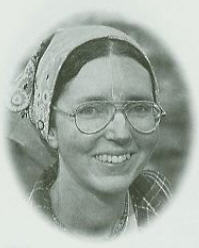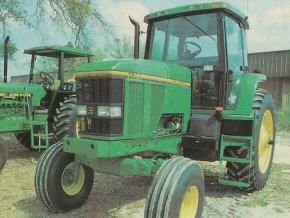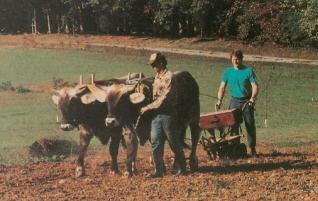
Hare Krsna Devi Dasi
MANY OF THE IDEAS of the Green movement seem to fit well with Krsna consciousness. The so-called Green Movement (not to be confused with the Green Revolution, which aims to industrialize farms around the world) officially began in Germany in 1983. It quickly spread through Europe and to America. Greens stand for nonviolence, democracy, social responsibility, and ecology (in particular, they want to point you toward a way of life sustainable within your local bioregion). Greens also stress decentralizing that is, making your politics and economy local. Finally, Greens seek a spiritual orientation to bring human culture into harmony with the earth.

In The Green Alternative: Creating an Ecological Future, Brian Tokar describes "the problem of how we feed ourselves" as "arguably the most vital component of a Green ecological strategy." In a section called "Greening Agriculture A Place to Begin," I found this:
A huge proportion of our food is now produced at huge, heavily mechanized industrial "farms" under the control of a handful of giant agribusiness firms. Their produce is cheap to grow and cheap to buy, but it is increasingly deficient in basic nutrients. It is often trucked thousands of miles to consumers, both urban and rural. Meanwhile the increasing use of chemical fertilizers, herbicides and insecticides sacrifices the basic fertility of our soils and spreads poison through our lands and through the food chain.
But I was surprised that Tokar, in his critique of centralized farming, was silent about its basic tool of destruction: the petroleum-powered tractor.
The tractor's role in modern society was foreshadowed in the late Middle Ages, when farmers started replacing draft oxen with European war horses. The horse let farmers work much larger plots of land. Bigger farms, held in fewer hands, could make more money and grow cheaper food. Displaced peasants provided cheap labor for factories. Cheap labor fed with cheap food set the stage for the industrial revolution. And the tractor has pushed things much further.
Srila Prabhupada told us that the tractor helped tear apart the Indian village system. Similarly, agricultural inventor Jean Nolle warns third-world villagers that most of them will lose their land to agribusiness if they let their communities get hooked on the tractor.
The tractor, it seems to me, could serve as an emblem of nearly everything the Greens stand against. I thought, If only Brian Tokar could talk to my friends in North Carolina Balabhadra Dasa and his wife, Chaya Devi Dasi. (They're Krsna conscious ox-power farmers.) He'd learn a lot about what the tractor does to ruin the environment and spoil human life. So, Brian Tokar, please meet Balabhadra and Chaya and let them give you some insights into the role of the modern tractor.
The Petrol-Powered Tractor
An Implement of Destruction
IN OUR TRAVELS we meet a lot of ecologically conscious people who seem to take tractor-powered farming for granted. So the first question we ask these folks is, How many mining operations do you need to make a tractor? You need mines for iron, coal, limestone, manganese, nickel, copper, bauxite, tin, zinc, just to name a few. For these minerals you have to rape Mother Earth and create hellish conditions for thousands of workers. And that's just step one.
Next come the smelting plants, where the ores are broken loose and cooked down. Now we're talking big industry huge factories, more hellish work. And we're getting into large-scale pollution.
From the smelting plants we go to the factory where the parts of the tractor are stamped out. Then another factory, where the tractor is put together. Still more hellish working conditions, still more pollution.

Now the tractor is finally assembled and sitting in the parking lot without tires. Where do we get the materials for the tires? People used to go to tropical countries and pay workers a few cents to cut rubber trees and bleed them for latex. These days we have steel-belted radials, made from synthetics derived from petroleum.
Speaking of petroleum, now that we have our tractor sitting on its tires in the parking lot, what does it run on? You can't put grass and oats in that tank. You need petroleum, which you might have to fight for. To prove it's yours, you may have to send troops to the Middle East to kill men, women, and children. You might have to sacrifice your son or even your daughter. And if you win, when the man with the Exxon Valdez comes to ship your oil across the ocean he may spill half of it into the sea.
The oil that's left goes to the refinery. If you've ever driven through a refinery town, you know the air smells like a skunk, and the water is so bad that even a skunk would think twice before drinking it.
But now our farmer has his tractor, his steel-belted radials, and his petrol. He fires up the engine and thinks, "With this tractor I can do the work of fifty oxen." He looks at his oxen and says, "I don't need you anymore. I've got my tractor. I've got my petroleum. You can go to the slaughterhouse." When you start killing bulls, you're destined to receive very negative karmic reactions.
Some of the karmic reaction begins right away. For a start, now you've got hapless people working in slaughterhouses, in jobs the U.S. government calls more dangerous and demoralizing than those in factories and mines.
But Mr. Agribusiness doesn't think about that. He thinks, "I don't have to feed those oxen anymore. That profit goes into my pocket." At the cost of their lives.
Then he looks at his teamsters, who used to work those oxen people who worked in the mode of goodness in the fields, growing grains and vegetables. He says, "I've already killed my oxen. I've got my tractor I've got no work for you. You're unemployed. Why don't you go work in the factory and make more machines? Or go on welfare."
Then he takes the tractor out to plow his field. Its heavy tires compact the earth, so the roots of his hybrid plants have trouble growing. He no longer has manure to nourish the soil, so he pours on commercial fertilizer, made with huge inputs of natural gas. Because the crops eventually deplete the organic things in the soil that hold moisture, his soil easily washes away into the stream. The weak soil that's left grows weak plants easy prey for weeds, bugs, and disease. So the farmer brings out his arsenal of pesticides and herbicides. These also wash downstream.
So that's the modern tractor. Does it fit with the values that groups like the Greens want to promote? Not at all. Instead, the tractor plows up the environment, spreads centralization and exploitation, and crushes spiritual life.
What's the alternative? When a cow gives birth, about half the time the calf is a bull. These bulls are Krsna's tractors, produced in the "factory" of the mother's womb. This factory doesn't pollute or create hellish working conditions. And it operates by the laws of nature, which Krsna has arranged.
Krsna's tractor can grow its own fuel oats and grasses. And with this tractor, even the wastes are useful. Cow manure can be processed to yield methane, a clean-burning fuel. The residue can go into the ground as a first-class fertilizer and soil-builder. No need for by-products from the slaughterhouse to build organic content.
What about working conditions? The relationship between the farmer and the oxen is based on love and trust. When the oxen see the farmer, they expect to be patted and stroked under the neck. In return they like to work, and they work well with an experienced farmer. It's the most satisfying kind of labor anyone could ask for.
When we use Krsna's tractor there's no pollution. And no violence. The farmer works side by side with the bull to grow the best natural foods. This kind of work inspired by Krsna consciousness gives the right ground to stand on for any group that wants a greener world.
Hare Krsna Devi Dasi, an ISKCON devotee since 1978, spent several years on the Gita Nagari farm in Pennsylvania. She is co-editor of the newsletter Hare Krsna Rural Life (please see page 59).
Balabhadra Dasa and Chaya Devi Dasi are initiated disciples of Srila Prabhupada, whose teachings inspired them to start the International Society for Cow Protection, a nonprofit educational organization with more than five hundred members. They're developing their farm in North Carolina into a self-sufficient farm that runs on ox power. For more information, you can call them at (919) 563-3643.
